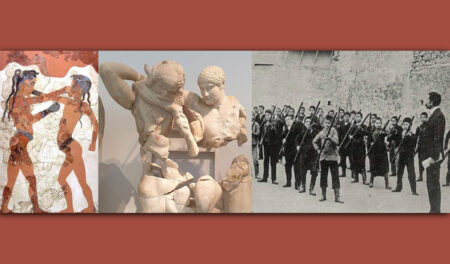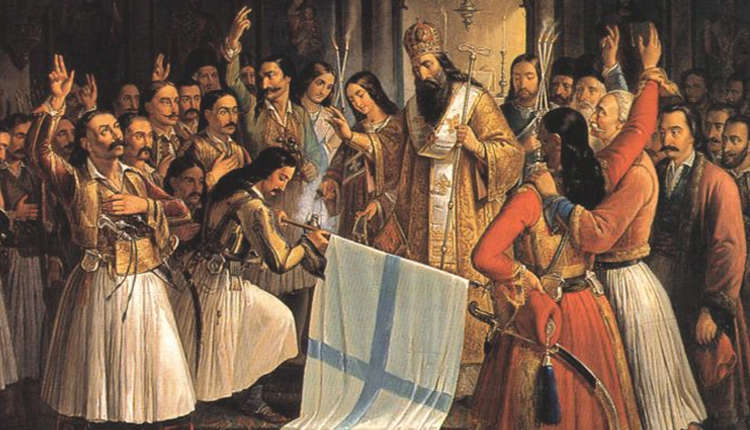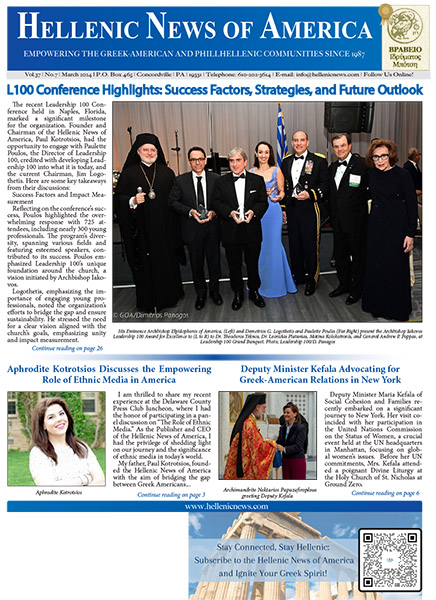The Greek revolutionary war for independence from the Ottoman Empire in 1821 was obviously momentous for Greece.
Few realize, though, the impact the Greek Revolution had on shaping world events, particularly here in America.
As Greece prepares to celebrate the 200th anniversary of its independence, a group in America is hosting events showing the role the Greek diaspora and Philhellenes around the world played in making the Revolution a success, and how the Greek war triggered causes for freedom beyond Greek’s borders.
The American Hellenic Revolution of 1821 Bicentennial Committee, formed by the Eastern Mediterranean Business Cultural Alliance, has been charged with organizing anniversary events here in America.
“Our focus will be the Revolution as an international event, not just a Greek event, but an event that will be important to the descendants of all the participants who supported the Revolution 200 years ago,” said Louis Katsos, president and founder of EMBCA, and chairman of AHEPA’s Hellenic Cultural Commission.
Also serving on the committee are two co-chairs of the Congressional Hellenic Caucus, New York Congresswoman Carolyn Maloney and Florida Congressman Gus Bilirakis; Rhode Island State Sen. Lou Raptakis, Hellenic News Founder Paul Kotrotsios, Greek American entrepreneur, researcher and community leader, Dr. Peter Stavrianidis; President of the Hellenic American National Council, Bill Mataraagas; writer Alexander Billinis; and Eric Hill.
EMBCA is planning and hosting the events, working with AHEPA and other associates.

The events culminate with the anniversary date, March 25, 2021 and include:
Aug. 12– An online panel discussion on Greek Genealogy and Tourism. Participating were two leaders in Hellenic genealogy and a major executive in international travel.
Aug. 13–A panel discussion and presentation on Aghia Sophia.
Coming up Aug. 30, will be a panel discussion webinar, “2,500th Year Anniversary of The Battle of Thermopylae and Salamis Commemoration ”
The webinar will be held in association with the Order of AHEPA Hellenic Cultural Commission.
The panel moderator will be Professor of Classics Joel Allen, Executive Officer of the PHD Program in History of the Graduate Center/Queens College.
The panel of experts will discuss the battles on the 2,500th year anniversary.
Click here for more details.
“Warrior Arts of the Hellenes: From Ancient Times to the Modern Era” will be Sept. 13 as a panel discussion Zoom webinar.
The discussion will look at the martial arts and combat sports that have been a part of Greece’s history going back to 1900 BC, as well as its role on the battlefield.
Click here for details.
On Sept. 27, there will be a panel discussion Zoom webinar on the “Hellenic Dual Citizen Initiative on the 200th Anniversary of the Hellenic Revolution.”
The initiative encourages anyone in the diaspora to apply for dual citizenship in Greece, if allowed by law and birthright.
Immigration experts and members of the Greek Ministry will be participating.
Click here for details.
“We’re going to have at least one event a month, maybe two events, linked to the anniversary,” Katsos said.
AHEPA will also be holding its supreme convention in Athens, Greece in July 2021, as another way to tie into the 200th anniversary, he said.

Support for the Revolution
It was a revolutionary time in the world 200 years ago. Intellectuals worldwide were contemplating the impact from the American Revolution and the French Revolution.
The idea of freedom resonated for many who saw the plight of the Christian Greeks suffering 400 years of brutal slavery under Ottoman Muslim oppressors.
There was a revival of interest in the neoclassical, in ancient Greece as the founder of western democracies.
So when a secret organization of revolutionaries in Greece called Filiki Eteria, or Society of Friends, decided to stage an uprising, the people of the world, including many Americans, took up the cause.
“All these things came together to make this an international event,” Katsos said.
While world leaders sided initially with the Ottoman Empire, citizens in those countries organized fundraisers for Greece in major cities, or traveled to Greece to join the fight against the Turks.
Many prominent figures in the Greek Revolution came from outside Greece, from the diaspora.
A noted example was Theodoros Kolokotronis, who was the foremost general of the Hellenic forces. He was away from mainland Greece for about 15 years, living on the Ionian Islands under British rule.
The impact of the Greek Revolution
Those Americans who went to fight to help Greece win its freedom returned home and became some of the founders for the abolitionist and women’s suffrage movements.
“When they came back to the United States after having fought in Greece they saw obviously the slavery that was in their own nation and they became abolitionists,” Katsos said.
Among them was Samuel Gridley Howe, an American physician and prominent abolitionist. He took up the Greek cause after earning a medical degree from Harvard Medical School, joining the Greek army as a surgeon and commander during the Revolution.
His wife, Julia Rush Ward Howe, was also an abolitionist and an early leader in the women’s suffrage movement. She’s also known as the composer of the “Battle Hymn of the Republic.”
James Williams was an African American slave in Baltimore who fought and died in Greece for the liberation of Greeks.
“Many people don’t realize what effect the revolution had beyond what took place in Greece,” Katsos said.







